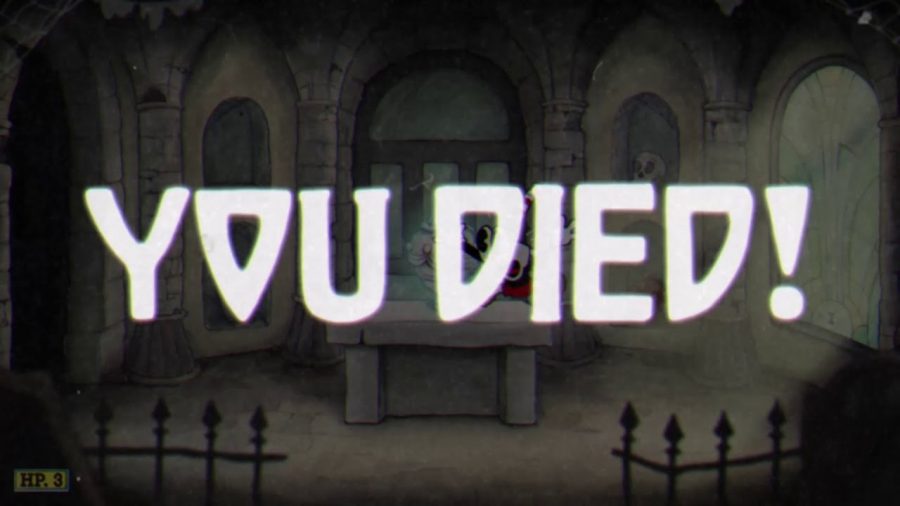I’ve spent the spring break playing Cuphead, a 2017 retro run-and-gun shooter video game, not unlike those old school 8-bit Nintendo classics like Contra and Donkey Kong. Most of you who play videogames or own an Xbox must know about this one; every reviewer and their mothers have been raving about Cuphead for months. More importantly, a lot of complaints were about how brutally difficult the game is. Players control Cuphead, a Mickey Mouse-like character with a cup for a head, and shoot every object in the game until they finish the stage. Typically they’re minions of the boss you’re trying to defeat, and there are 28 of them. I say objects, because even playing cards, treasure chests, and cotton candy can hurt you. I’m not even kidding.
I avoided it for months because I considered it to be something my 7-year-old self would play before I tried it. I was blown away by the 1930s rubber-hose animation seamlessly adopted, complete with scratchy film grain, jazz soundtrack and overtly ridiculous caricatures of seemingly commonplace objects and plants. If my previous Spiderman article didn’t make it clear enough, I am an ardent fanatic of hand-drawn animation styles, and incorporating that into a game that runs in 60 frames per second is no feat.
But you won’t appreciate it for very long, because the game does literally everything in its power to kill you. I’m still in world 2 and have already started looking at strategies to defeat bosses as well as watching anger management therapy videos in different tabs.
This actually reminds me of a similar experience I had with another extremely hard, extremely retro video game called Super Meat Boy in which players control a boy made of meat. He has to avoid traps like spikes, buzzsaws, barbed wire and other instruments of torture, to save his girlfriend, Bandage Girl from the evil clutches of Dr. Fetus. Yeah, I wish I was making this up.
The thing that makes this game hard is how you die in one hit and have to start the level from the beginning. And the traps are really fast. Unlike Cuphead’s ridiculously arbitrary enemy spawning, the traps here are organized and predictable. Unfortunately, Super Meat Boy does not have anything to defend himself. His only superpowers are running really fast and sticking to and sliding on walls before he turns into…dead meat.
But why would I want to suffer through video games like these? Why can’t I play Call of Duty or something? Because I’m a masochist. Not just me, innately every one person is. The nineties was the golden age of retro shooters. Video games used to be really hard then because you only get three chances to finish the entire game without dying. People used to actually try and put in an effort to finish the game. It gives you a sense of accomplishment, a feeling that you’ve earned the right to progress and enter the next level. You need to have a perfect 20/20 vision and ninja-like reflexes.
In the end, you’ll have frayed nerves, parched throat, shivering hands as you collapse on the ground with exhaustion. But ultimately you emerge victorious, like a warrior out of a sandstorm, battle-hardened and nothing to fear. You’re the alpha and the omega, your heart pumps 400 times a minute and you can shoot the wings off of a bumblebee two hundred yards away. I admit a part of this is gospel truth, but the main point is “Whatever doesn’t kill you simply makes you stronger.”
Unfortunately, these indie-developers, a term the industry uses for games made by independent developers such as PlayDead (Limbo, Inside), Telltale Games (The Walking Dead) & Naughty Dog (Uncharted series) are usually bought by bigger companies such as EA and Activision who butcher the creativity out of them, force them to make a crappy game and ultimately shut them down.
This results in companies introducing easy ways for players to “win” where they “buy” victories using a payment system called “micro-transactions” to purchase upgrades and better equipment using real-world money. You know, instead of “earning” them—with hard-work and skill. Now we have 12-year olds insulting each other’s moms and losing it and breaking TVs when they get killed in Rainbow Six: Siege by internet trolls. Obviously, you need the skill to be good at online multiplayer, but why be skilled when you can buy an arsenal worth of weapons for $50?
It’s quite disheartening that games used to be challenging with a novel story told effortlessly using great narratives, creative game designs, and gameplay. Now technology has developed so much that we stopped putting in the effort, both to play them, and to create them. I remember a quote by Joker from The Dark Knight that summarises this perfectly: “It’s not about money, it’s about sending a message.”
In several of my articles, I described video games as a form of art. Titles like Cuphead, Super Meat Boy, Celeste and Inside are only as good as the people supporting them. These indie-developers do not prioritise money; they make games that they love to play, games that cross the threshold of what games can achieve. Choose games you love to play, not what’s currently trending in GameStop. That way you realize the value of money, and how much you’re wasting it on worthless garbage like Black Ops IV and Anthem.





